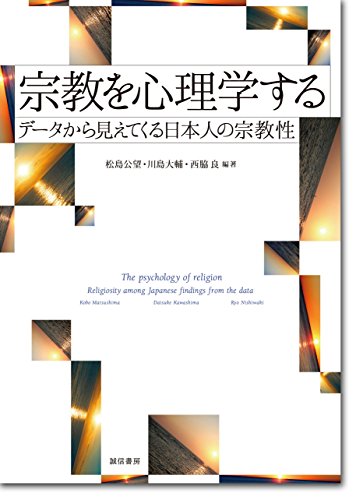63 0 0 0 IR 恋愛関係が大学生のアイデンティティ発達に及ぼす影響
- 著者
- 北原 香緒里 松島 公望 高木 秀明
- 出版者
- 横浜国立大学教育人間科学部
- 雑誌
- 横浜国立大学教育人間科学部紀要 1 教育科学 (ISSN:13444611)
- 巻号頁・発行日
- vol.10, pp.91-114, 2008-02
- 著者
- 松島 公望 林 明明 荒川 歩
- 出版者
- 日本社会心理学会
- 雑誌
- 社会心理学研究 (ISSN:09161503)
- 巻号頁・発行日
- vol.35, no.2, pp.39-49, 2019-11-30 (Released:2019-11-30)
- 参考文献数
- 38
This study examined the relationship between Christian religious consciousness (CFC) and subjective well-being for Japanese Christians. Members of the Roman Catholic Church (status of denomination: Believers, n=58; Leaders, n=61) and of the A subgroup of the Holiness Church (status of denomination: Believers, n=646; leaders, n=102) participated in the research. Based on factor analysis, we developed a scale of CFC that contained three factors: “Christian doctrine-based belief,” “norms of religious activities,” and “relationship with other church members.” Hierarchical multiple regression analysis on CFC and subjective well-being showed that the people who had high “Christian doctrine-based belief” or a high “relationship with other church members” have high subjective well-being, and that they were partially influenced by subjective well-being among denominations. However well-being was not influenced by status of denomination. These results indicate that subjective well-being rests largely on CFC, although a small portion of it rests on the type of denomination.
2 0 0 0 OA 日本における実証的宗教心理学は進展している
- 著者
- 松島 公望
- 出版者
- 『宗教/スピリチュアリティ心理学研究』編集委員会
- 雑誌
- 宗教/スピリチュアリティ心理学研究 (ISSN:27581004)
- 巻号頁・発行日
- vol.1, no.1, pp.1-2, 2023 (Released:2023-08-30)
- 著者
- 松島 公望 林 明明 荒川 歩
- 出版者
- 日本社会心理学会
- 雑誌
- 社会心理学研究 (ISSN:09161503)
- 巻号頁・発行日
- pp.1730, (Released:2019-10-21)
- 参考文献数
- 38
This study examined the relationship between Christian religious consciousness (CFC) and subjective well-being for Japanese Christians. Members of the Roman Catholic Church (status of denomination: Believers, n=58; Leaders, n=61) and of the A subgroup of the Holiness Church (status of denomination: Believers, n=646; leaders, n=102) participated in the research. Based on factor analysis, we developed a scale of CFC that contained three factors: “Christian doctrine-based belief,” “norms of religious activities,” and “relationship with other church members.” Hierarchical multiple regression analysis on CFC and subjective well-being showed that the people who had high “Christian doctrine-based belief” or a high “relationship with other church members” have high subjective well-being, and that they were partially influenced by subjective well-being among denominations. However well-being was not influenced by status of denomination. These results indicate that subjective well-being rests largely on CFC, although a small portion of it rests on the type of denomination.
1 0 0 0 宗教を心理学する : データから見えてくる日本人の宗教性
- 著者
- 松島公望 川島大輔 西脇良編著
- 出版者
- 誠信書房
- 巻号頁・発行日
- 2016

